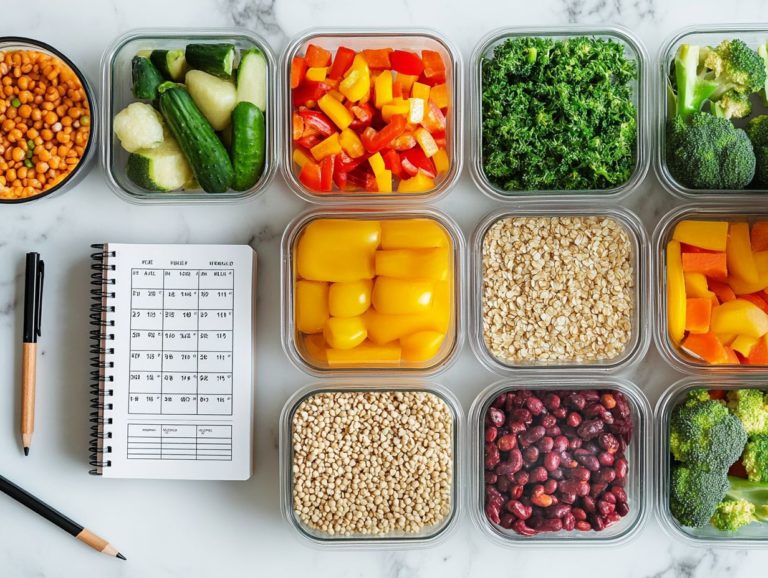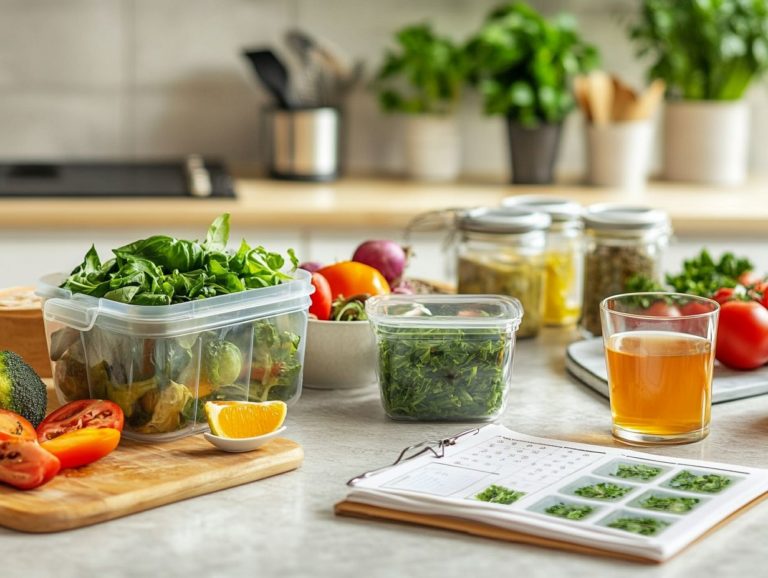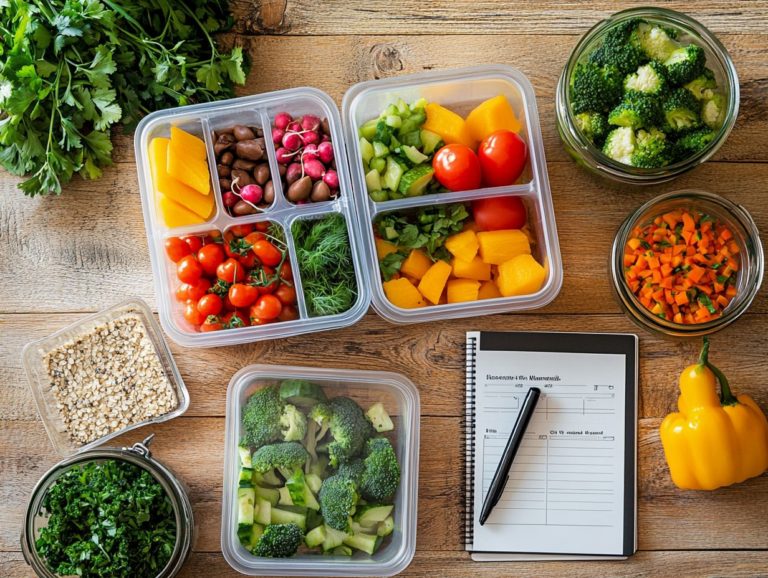5 Meal Planning Mistakes to Learn From
Meal planning has the potential to revolutionize your health and lifestyle, yet many encounter obstacles on this journey.
This article highlights five common meal planning mistakes that might be undermining your efforts. Neglecting dietary restrictions and bypassing seasonal produce can lead to frustration and wasted resources.
You ll discover the myriad benefits of meal planning, along with straightforward tips to streamline the process and maintain your commitment to your plan.
Ready to transform your meals? Let s get started!
Contents
- Main Takeaways
- 1. Not Considering Dietary Restrictions or Preferences
- 2. Not Having a Variety of Options
- 3. Not Planning for Leftovers or Freezing Meals
- 4. Not Taking Advantage of Seasonal Produce
- 5. Not Factoring in Time for Preparation and Cooking
- What Are the Benefits of Meal Planning?
- How Can One Create a Balanced and Nutritious Meal Plan?
- What Are Some Tips for Making Meal Planning Easier?
- How Can One Incorporate Meal Planning into Their Busy Schedule?
- What Are the Common Excuses for Not Meal Planning and How to Overcome Them?
- How Can One Stick to Their Meal Plan and Avoid Impulse Eating?
- Frequently Asked Questions
- What are some common meal planning mistakes to avoid?
- How does not creating a grocery list affect meal planning?
- Why should you consider dietary restrictions in meal planning?
- What issues arise from not planning for leftovers?
- How can sales and deals enhance meal planning?
- Why is flexibility important in meal planning?
Main Takeaways
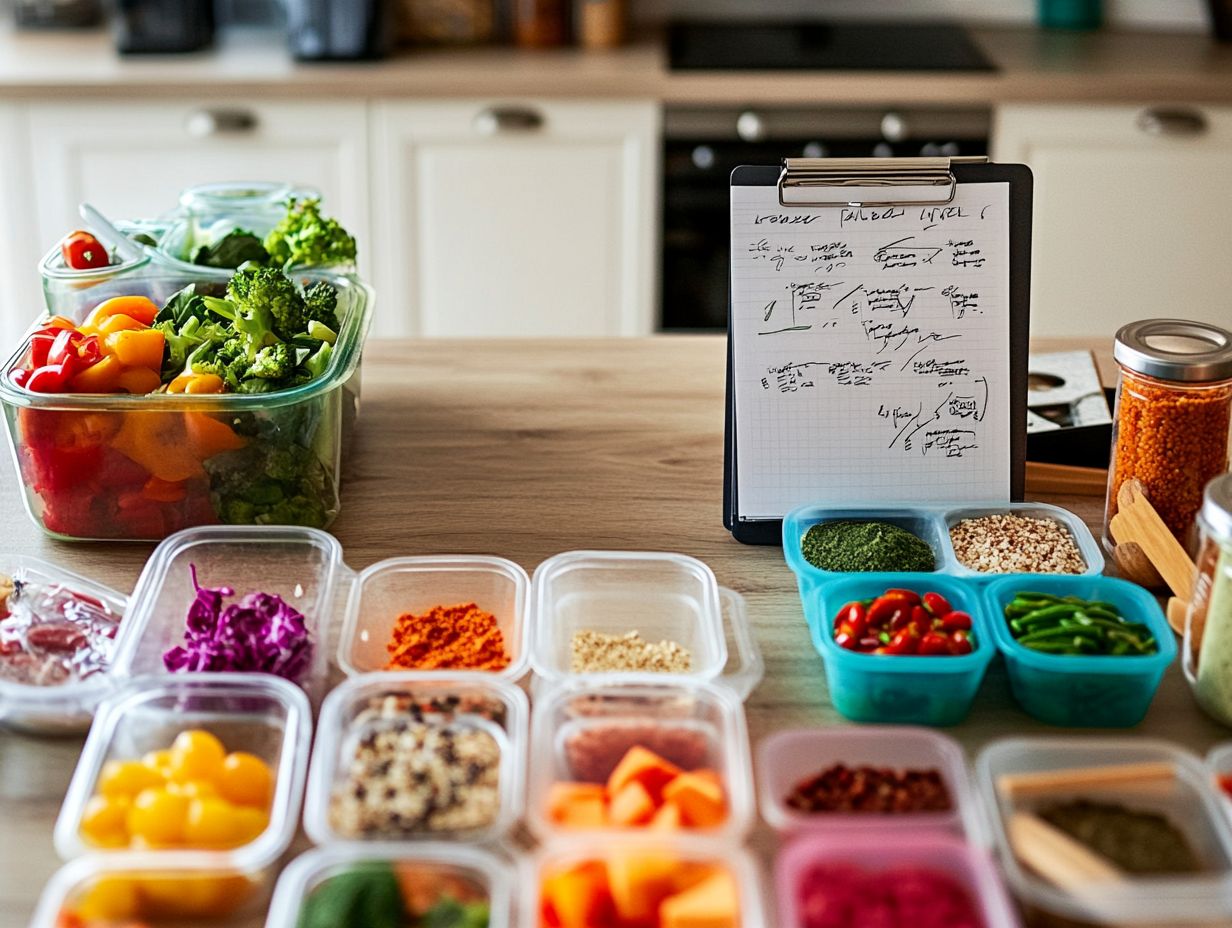
- Consider dietary restrictions and preferences when meal planning to ensure everyone’s needs are met.
- Incorporate a variety of options to prevent boredom and provide balanced nutrition.
- Plan for leftovers or freeze meals to save time and money.
1. Not Considering Dietary Restrictions or Preferences
When you embark on your meal planning journey, it s vital to consider the dietary restrictions and preferences of each family member. This approach ensures everyone has access to healthy meal options that are enjoyable and sustainable over time.
Explore diverse options, whether it s gluten-free grains for those with sensitivities or alternatives to common allergens like nuts. Open communication within the family about these dietary preferences is key, encouraging everyone to voice their needs.
When seeking assistance from a nutritionist or online resources, clearly explaining these restrictions can lead to personalized guidance. By prioritizing a meal plan that balances taste and nutritional content, each dining experience becomes both nourishing and accommodating, transforming mealtime into a celebration.
2. Not Having a Variety of Options
Failing to incorporate a variety of options in your meal plan can lead to a monotonous eating routine, turning meal prep into a tedious chore instead of an enjoyable experience. Including diverse, healthy options is essential.
Exploring different cuisines can elevate mealtime, injecting a sense of adventure and preventing the boredom that often accompanies repetitive dishes. Imagine rotating your weeknight dinners with a zesty lemon chicken stir-fry one night, followed by vegetable spaghetti the next.
To spark your culinary creativity, browse food blogs, enroll in local cooking classes, or follow social media accounts dedicated to home cooking. Experimenting with seasonal ingredients enhances flavors and keeps your meal repertoire vibrant and appealing.
3. Not Planning for Leftovers or Freezing Meals
Neglecting to plan for leftovers or freeze meals can lead to unnecessary food waste and missed opportunities to save valuable time during hectic weeks. It s essential to weave strategies for utilizing leftovers into your meal planning framework.
By embracing meal prep recipes designed with leftovers in mind, you can maximize the efficiency of your cooking efforts while enjoying a variety of meals throughout the week without the hassle of daily cooking. Techniques like batch cooking and proper portioning make freezing effortless.
Creating an organized shopping list not only streamlines your grocery shopping but ensures that all necessary ingredients are on hand. This makes it easier to stick to your meal plans without frustrating last-minute trips to the store.
4. Not Taking Advantage of Seasonal Produce

Not using seasonal produce can hurt your meal planning. Fresh, in-season fruits and vegetables boost flavor and support local farms while being budget-friendly.
Focusing on what’s in season transforms your meal planning into a delightful adventure. Vibrant colors and flavors make every dish more enticing. Exploring local farmer’s markets or using grocery delivery services that prioritize seasonal items can streamline this process, ensuring the freshest ingredients arrive right at your doorstep.
To complement these choices, maintaining a well-organized pantry stocked with staples can simplify meal preparation and minimize food waste. By keeping an inventory of versatile herbs, grains, and canned goods, you can quickly whip up meals that showcase the season s best offerings while embracing a sustainable approach to eating.
5. Not Factoring in Time for Preparation and Cooking
Overlooking the time needed for preparation and cooking can derail even your most ambitious meal planning efforts, especially during busy weeks. It’s essential to adopt a strategic approach to time management that harmonizes cooking responsibilities with your family s schedules, paving the way for stress-free planning.
Consider the time needed for every cooking step, from washing to cooking. This way, you can plan specific time blocks for meal prep.
Let s dive into some exciting meal planning tips that can streamline your cooking processes:
- Create a detailed menu for the week.
- Organize your ingredients in advance, allowing for quicker access when it’s time to cook.
Embracing batch cooking provides you with ready-to-heat meals for those hectic evenings, ultimately saving you time and alleviating stress in the kitchen.
What Are the Benefits of Meal Planning?
Meal planning offers a wealth of benefits that can elevate your cooking experience. These benefits range from stress-free organization and reduced food waste to healthy family meals that fit seamlessly into your busy lifestyle. It also encourages creativity in the kitchen, supporting everyone s nutritional needs through thoughtful choices and well-crafted shopping lists.
By dedicating time to plan your meals in advance, you can ease the daily stress of deciding what to cook. This foresight not only saves you from last-minute grocery runs but also cuts down on impulse purchases, leading to a more streamlined shopping experience.
With a carefully curated shopping list, you can zero in on nutritious ingredients that promote healthier eating habits, making it simpler to prioritize fresh fruits and vegetables. Thoughtful planning significantly reduces food waste, allowing you to utilize resources more responsibly and embrace a more sustainable lifestyle.
How Can One Create a Balanced and Nutritious Meal Plan?
Creating a balanced and nutritious meal plan requires a thoughtful approach to selecting healthy options that cater to your diverse dietary needs. Each meal should incorporate a variety of food groups while prioritizing nutritional content to foster your overall health and wellness.
This involves not just including fruits and vegetables, but also ensuring a harmonious mix of whole grains, lean proteins, and healthy fats. To get started, assess your personal cravings and health goals, and compile a grocery list based on these insights. Next, organize your meals by choosing recipes that use similar ingredients; this not only reduces waste but also saves you precious time.
As a meal prep veteran would tell you, preparing large amounts of food at once for future meals can turn weeknight dinners into a delightfully simple affair. Consider whipping up straightforward recipes like:
- Quinoa salads
- Grilled chicken wraps
- Vegetable stir-fries
These dishes can easily adapt to different tastes and dietary restrictions, showcasing the impressive versatility of a well-planned menu.
What Are Some Tips for Making Meal Planning Easier?
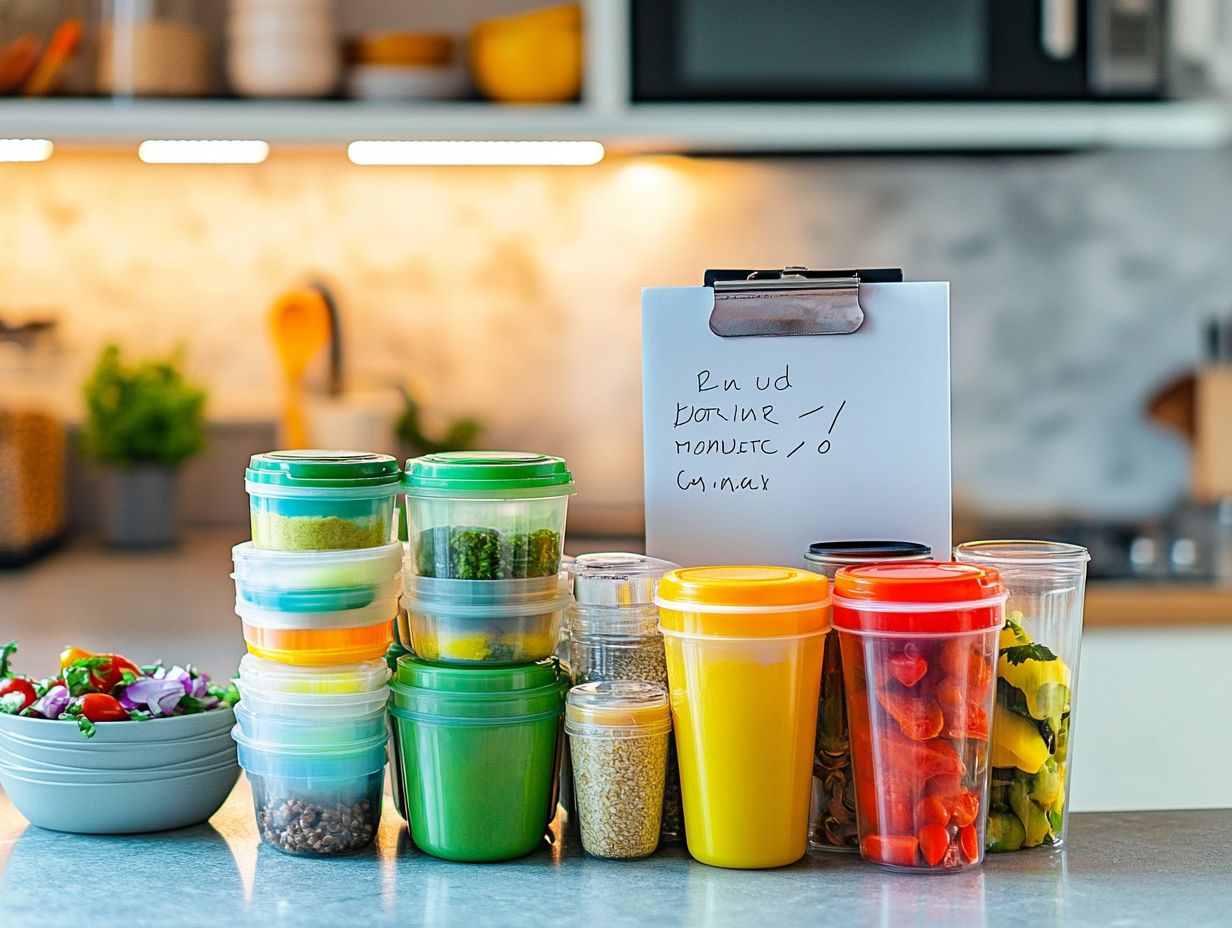
To simplify your meal planning and transform it into an enjoyable experience, consider these 5 tips for planning balanced meals that help streamline your routine. These tips will lighten your cooking load and facilitate stress-free planning.
Utilizing resources such as grocery delivery services and well-organized shopping lists can make a world of difference.
By embracing some time-saving strategies, you can completely revamp your approach to meal prep. Start by setting aside a specific time each week to brainstorm meal ideas. This practice not only sparks creativity but also ensures that your meal choices align with your dietary preferences and seasonal ingredients.
Taking advantage of grocery delivery services can significantly cut down on your in-store time, offering convenience and reducing the temptation for impulse buys. Organizing your shopping list by item and aligning it with your grocery store’s layout can turn the shopping experience into a swift and efficient endeavor, paving the way for mealtime success.
How Can One Incorporate Meal Planning into Their Busy Schedule?
Incorporating meal planning into your busy schedule is absolutely achievable with effective time management strategies. By embracing efficient meal prep, you can savor nutritious meals without the stress of last-minute cooking dilemmas.
To successfully carve out time for meal planning, consider setting aside a couple of hours each week perhaps during a serene afternoon or evening to map out your menu. This proactive approach not only streamlines your grocery shopping but also allows you to include recipes that cater to your family s diverse tastes.
Quick and easy meal prep recipes, like sheet pan dinners or one-pot pasta dishes, can truly be your culinary lifesavers. Preparing versatile ingredients such as grilled chicken, roasted vegetables, or quinoa will provide the flexibility you need throughout the week. This ensures that every family member enjoys the flavors they love while maintaining a healthy diet.
What Are the Common Excuses for Not Meal Planning and How to Overcome Them?
Common excuses for not engaging in meal planning often arise from thoughts of time constraints or a lack of inspiration. However, with a proactive mindset and some strategic meal planning tips, you can easily overcome these obstacles and establish a sustainable routine that seamlessly fits into even the busiest of weeks.
You might feel overwhelmed at the thought of planning meals amid your packed schedule, convinced that it demands extensive time or exceptional cooking skills. But by breaking meal planning into smaller, more manageable tasks and enlisting help from friends or family, these challenges can become quite manageable.
Exploring various resources, such as meal prep apps or recipe blogs, can ignite your inspiration and simplify the planning process. By dedicating just a brief period each week to outline your meals, you can streamline your grocery shopping and alleviate stress.
With these adjustments, meal planning transforms from a daunting task into a delightful and rewarding experience!
How Can One Stick to Their Meal Plan and Avoid Impulse Eating?
Sticking to a meal plan and sidestepping impulse eating is entirely within your reach when you employ disciplined strategies. It all begins with an organized shopping list, which serves as your roadmap to success. Thoughtfully incorporating healthy snacks that complement your meal plan not only satisfies cravings but also maintains balanced nutrition.
By taking the time to plan your meals ahead of schedule, you can ensure you have everything necessary to whip up nutritious dishes. This effectively avoids those last-minute grocery runs that often lead to unplanned purchases. Preparing healthy snacks think cut-up vegetables, fresh fruits, or whole-grain energy bars acts as a powerful shield against unhealthy temptations when hunger strikes. Keeping these snacks within easy reach reinforces your commitment to making healthier choices throughout the day.
Setting specific days for meal prep and crafting a grocery list based on that plan cultivates consistency, solidifying your dedication to a healthier lifestyle.
Frequently Asked Questions

What are some common meal planning mistakes to avoid?
Some common meal planning mistakes include not making a grocery list and ignoring food preferences or allergies. Additionally, it’s important to consider 5 meal planning tips for weight gain to avoid forgetting about leftovers and missing out on sales.
How does not creating a grocery list affect meal planning?
Not having a grocery list can quickly lead to overspending! You might buy unnecessary items and forget important ingredients.
Why should you consider dietary restrictions in meal planning?
Considering food preferences ensures everyone in your household can enjoy meals. This approach helps avoid wasting food and money on items that can’t be eaten.
What issues arise from not planning for leftovers?
Neglecting to plan for leftovers can limit meal variety. Plus, it may lead to wasted food if leftovers aren’t eaten promptly.
How can sales and deals enhance meal planning?
Sales and deals help you save money on groceries and boost meal variety. They also present a great chance to experiment with new recipes!
Why is flexibility important in meal planning?
Flexibility in meal planning allows you to adapt to unexpected events. It also encourages trying new dishes or dining out when the mood strikes!


